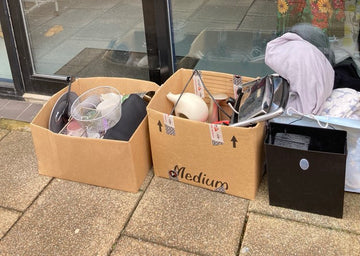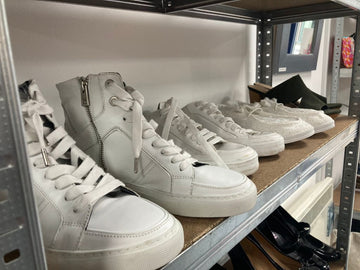Here’s Why Shopping Second Hand Fashion Is Ethical and Why Everyone Should Do It
Shopping second hand can be an ethical minefield whether you're buying preloved garments to wear, or worse, reselling. Second hand fashion resellers are under fire for profiting from cheap clothing bought from charity and second hand shops.
So let's take a closer look, is buying preloved clothes ethical? Should you avoid doing it if you can afford to?
Here’s Why Shopping Second Hand Fashion Is the Right Thing To Do
Is Shopping Second Hand Fashion Unethical?
The main argument against everyone buying second hand clothing is that it is depriving those in need of affordable clothes.
But this idea quickly falls apart. There are so many shocking fast fashion statistics, like this famous one from the Ellen MacArthur Foundation; a truckload of clothing goes to landfill or is burnt every second around the world. We are overproducing on a cataclysmic scale and people and planet are suffering.
We need to encourage even more people to buy second hand in order to save as many clothing items from landfill.
Second hand fashion scarcity is a myth; millions of clothes are being sent from Europe to Ghana every week. 900 million garments were to Kenya in 2021. These clothes are even being burnt for fuel and water because there is so much poor quality clothing.
So there are still plenty of clothes to go around, even for those who have low or no income.
Not all clothing can be resold for silly amounts. This is mainly the designer or high end fashion pieces that are priced up at eye-watering levels. Everyday fashion still remains cheap, especially through resale sites like Vinted or eBay.
How abundant are clothes today? I'm wearing overalls from a fast fashion maker. They're perfect 90s cut that many of us grew up with but I could NEVER give this corporation my money. Even though, plus sizes. I tried them on in store and then I simply went and bought them on eBay
— Aja Barber (@AjaSaysHello) March 4, 2023
Does Buying Second Hand Clothing Support Fast Fashion?

It is common to find brand new fast fashion in charity shops now. These aren't just garments that have been donated by regular people. Various high street and fast fashion brands are working with charities to help deal with their deadstock and returns.
So there is an argument that when you buy preloved clothing from a fast fashion brand, you are still supporting them.
Let's break this down.
It's unlikely that the fast fashion company is making much revenue from the resale of its garments directly. They will be if they set up their own resale platforms, of course.
You could be said to be 'advertising' the brand if you walk around with a T-Shirt with a big Shein logo on it. And the same can be said for anyone who recognises the style of the clothes you're wearing. But that doesn't force them to go out and buy more of it, unless of course you're some kind of influencer! But even then, second hand fashion influencers exist. You'd simply explain that you don't necessarily support the brand, but you do champion the practice of buying any garment second hand to stop it from going to landfill.
The easy alternative is just to avoid fast fashion altogether and go for higher quality brands. When you buy preloved, you can usually afford the better brands that have less of a bad rep, anyway.
Charities that help with clothing poverty

Another point to highlight is that those who cannot truly afford clothing are unlikely to even afford charity shop clothing.
Instead there are some amazing charities out there who give clothes to people who need it most.
We work with an amazing charity called Peace of Mind North East. They help refugees and asylum seekers. This of course includes providing good quality clothing.
There are some other great local charities who provide free interview wear including: Newcastle Smart Works and Suitability.
Ethics of buying oversized second hand fashion
A slightly different question; is it ok to shop oversized second hand clothing? I.e, should you buy clothing that is not in your size, to alter or just to wear as oversized?
Again this argument seems to be referring back to the idea of scarcity. Scarcity might exist in individual shops, especially if you were to walk in and buy all the size 30 dresses in the shop.
It is best to try and buy clothing in your size that doesn't need drastically altering.
But again there is a wealth of items that crop up online. And the more that we encourage more people to shop preloved, there will be more choice across all sizes.
Like where are people getting this idea that the thrift stores are getting entirely cleaned out by these random depop girls. This is literally not happening no matter how many anecdotal tiktoks you’re watching. There are literally too many clothes. There will always be too many.
— Ashley Reese (@offbeatorbit) February 22, 2023
Can You justify gentrified thifted fashion prices?
A lot of the complaints surrounding the resale of second hand fashion are some of the prices that garments go for especially on the likes of Depop or Vestiaire Collective.
Regardless of the quality of the brand, hand-picking garments to resell is still something that requires time and effort. So when you start to factor in a real living wage and the work required to find a garment, wash it, repair it, photograph it, list it, negiotiate a price, sell it, ship it, it starts to make more sense.
In fact, this is partly the reason why many brands struggle to deal with their deadstock and returns in the first place. It costs money and time to sell clothes, regardless if they're new or used!
So what's stopping us from all doing the same? Arguably, nothing. There are bales and bales of so called 'vintage' fashion which has led to a great number of vintage fashion stores springing up.
Just near us we have Drip in Newcastle, along with the Vintage Store, the Yesterday Society, Waceland, Flip Vintage, The Vintage Scene just to name a few just in one UK city.
All of these are small businesses that have staff and overheads to pay. Even then the prices are still comparable to high street fashion stores.
Even with these thriving vintage businesses with physical shops, there are loads of individual resellers online. There is just so much fashion to go around.
It is better than the alternative of clothes wasting away in wardrobes, or worse, landfills.
The Future of Second Hand Fashion as an Ethical Way to Shop

Aja Barber wrote an entire book called Consumed which debunks the idea of scarcity in second hand, published 2021.
And yet recent conversations across Twitter and TikTok have constantly upbraided Depop resellers. These are signs of how much change is still needed to embrace preloved fashion.
We continue to live on a planet that is in a climate emergency. That's somehow become a norm that we have to live through. But as waste continues to mount up and as we increasingly need to do something to save our planet, there will be an increasing market for second hand fashion, surely!
Stigmas of second hand shopping are all-but fading away. Young people are starting to embrace preloved fashion. A vocal minority are moaning about buying and selling used clothing.
Eventually, do we get to a place where the majority of people buy second hand clothing?
Fashion brands could help by setting up and encouraging resale platforms. They could stop overproducing clothing and focus on how to make a smaller profit from repairing and recycling their old lines.
Even then demand is not likely to outstrip supply. Fast fashion is so tantalising cheap and accessible. It's just part of the system we live in that seems to overproduce in the name of 'growth'.
The more that people get involved in some kind of preloved fashion, the more ethical it can become.
On a local scale, clothes swap events become more effective when more people take part.
Nationally, having more people listing their surplus clothes online means more choice for those looking.
Hopefully it means people buy less new clothing, reducing the amount of resources required, as well as carbon emissions throughout the whole process.
Conclusion - it is ethical to buy and even resell second hand fashion
We need to redirect the outrage of people reselling clothes to the fast fashion brands who are overproducing those very clothes in the first place. There are millions of garments going to waste.
So regardless of whether you can afford to buy brand new, it's okay to buy preloved; it's ethical and sustainable, good for people and planet.
Of course, we need to keep the price of clothing low, so second hand fashion continues to be accessible for everyone.




